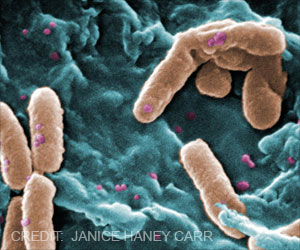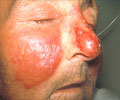- Therapeutic application of bacteriophages in the treatment of drug resistant bacteria was evidenced in the treatment of a critically ill patient
- A mix of bacteriophages was introduced intravenously and was found to be effective with no side effects
- The phage therapy could be used to control the rampant spread of drug resistant strains of bacteria
According to the World Health Organization, antibiotic resistant microbes are one of the greatest threats to global health, development, as well as for food security. It is estimated that antibiotic resistant strains of micro-organisms will result in the death of at least 50 million people every year by 2050.
The first author of the study, Dr. Robert Schooley said, that the patient, Tom, was in a very critical stage and the scientists approached the FDA for approval to treat the patient with bacteriophages. This is the first known case of a patient being treated using intravenous injection of bacteriophages.
The Patient History
Dr. Tom Patterson, PhD, from UC San Diego School of Medicine’s Department of Psychiatry, contracted an infection while on a holiday in Egypt, which led to pain, a racing heartbeat, vomiting and nausea. His condition was diagnosed as pancreatitis and his condition became worse as the therapeutic measures used did not offer a cure. A pancreatic pseudocyst was identified and when the fluid was cultured, it was found that Dr. Patterson was infected with a multidrug-resistant strain of Acinetobacter baumannii.
- tigecycline
- meropenem
- colistin
Dr. Patterson’s wife Dr. Strathdee is the Director of UC San Diego Global Health Institute and has worked to reduce HIV infection and mortality rates from Afghanistan and India to Mexico.
An estimated 1031 bacteriophages exist and every phage has evolved to infect a specific strain of bacteria. They do not infect the other cells in an organism.
Three separate teams of scientists developed purified phage samples which could be used for therapy
- The Center for Phage Technology at Texas A&M University
- AmpliPhi, a biotech company that specialized in therapies using bacteriophages
- A research team led by Dr. Forest Rowher from the San Diego State University
Normally phage therapy is administered orally but as they were meant to address a complex infection, they were introduced into Dr. Patterson intravenously who woke up from his coma within 3 days.
Initially, the doctors had been worried about the toxicity caused due to the endotoxins secreted by the bacteriophages. However, there were no adverse reactions to the therapy.
Further Treatment:
The bacteria that infected Dr. Patterson developed resistance to the strain of phage that was used initially but the scientists altered the phage strains, some of them isolated from sewers, to improve treatment. Dr. Patterson was completely cleared of A. baumannii after a few months of treatment and was discharged from the hospital.
Dr. Patterson lost a lot of weight post treatment, as he had been on intravenous fluid for many months. These effects were not associated with the phage therapy but physical therapy was required to help regain strength.
Personalized Medicine:
In phage therapy, every individual would require phage cocktails based on the specific strains of organisms present, unlike antibiotics. This will pave the way for personalized medicine.
In the use of traditional antibiotics, the following disadvantages could occur
- Resistance to the antibiotics, like in this case, could occur.
- These antibiotics could eliminate all gut bacteria, hampering the digestive process and providing a substrate for growth of potentially harmful bacteria.
- The drugs could interact with multiple tissues and cause damage, which lead to side effects.
- The bacteriophages that are used are specific to certain strains of bacteria and will not affect the other organisms present.
- The risk of infecting other tissues in the body is minimal and no known side effects have been identified.
- They are effective against the bacteria and will grow and multiply in their presence.
Multidrug resistant strains of bacteria have the potential of leading to large scale infections, however, the potential use of bacteriophages in the treatment of such bacteria could be used to control the spread of such infections.
References:
- Antibiotic resistance - (http://www.who.int/mediacentre/factsheets/antibiotic-resistance/en/)
- Phage treatment of human infections - (https://www.ncbi.nlm.nih.gov/pmc/articles/PMC3278644/)
















